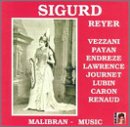| All Artists: Reyer, Vezzani, Payan, Endreze, Caron, Renaud Title: Sigurd (1903-1934) Members Wishing: 1 Total Copies: 0 Label: Malibran [C.D.R.G.] Release Date: 3/15/2000 Genre: Classical Styles: Opera & Classical Vocal, Historical Periods, Modern, 20th, & 21st Century Number of Discs: 1 SwapaCD Credits: 1 UPCs: 675754169428, 3760003771518 |
Search - Reyer, Vezzani, Payan :: Sigurd (1903-1934)
 | Reyer, Vezzani, Payan Sigurd (1903-1934) Genre: Classical
|
Larger Image |
CD Details |
CD ReviewsExtremely enjoyable, even if not the best 09/23/2003 (4 out of 5 stars) "SIGARD: Composer, Ernest Reyer (1823-1909)
This particular recording is not the best of this opera, and I cannot even say for sure that it is complete. It is a compilation of many recordings pulled together into one. That explains the numerous number of conductors. Historically, this recording is of great importance, for we are hearing the voices of the times, great voices (like Marjorie Lawrence) that were also the Greatest French singers of Wagner. These singers were wonderful, and most of them did sing Wagner's Ring at one time or other in their careers. Lawrence, in her autobiography (Interrupted Melody) speaks very highly of the work. She was one who wrote about singing both this opera, and the Wagner Ring (sadly, though she sang it in German while in New York, any extracts one is able to find of her singing Wagner, or any German composer, are all sung in French). There is another recording of the work, and it is complete, but I can't find it in the Amazon catalogue. It is published by LDC 278 919 Chant du Monde, published in France, and distributed by Harmonia Mundi France. It was recorded in 1989. Few of the singers were familiar to me (only Andrea Guiot recordings are part of my collection, and then only one - highlights from Rossini's Guillaume Tell), but I have recordings by the conductor, Manuel Rosenthal. This version is virtually complete, and I recommend it over the reviewed version (the historical one) because one of the most important parts of Reyer's operatic writing was his use of the orchestra, which comes across quite poorly in the historical recording. A note must be said about the work itself. This is not a pale imitation of Wagner and his Ring Cycle, as so many writers would have the public believe. Wagner's source for his Ring was actually many sources all put together in Wagner's quite unique way, and often with virtually NO fidelity to the original source. The Nibelungenlied is cited often as his source, whereas the awakening of Brunhilde is completely a portion of the Eda, an Icelandic work. Wagner took all the legends he knew and whipped them all together into the massive and wondrous work he created. Though Reyer's opera does deal with some of the same characters, the events are not at all the same. His source is the Nibelungenlied, and he begins his story with Attila (called Ezle in the poem) sending representatives to the Burgundies seeking a wife. Gunther's sister, Hilda, would rather remain single for life than marry the Hun. Through magic, done by her mother, Uta, Sigard comes to visit them. Sigard is not deceived into helping Gunther seek Brunehild as a wife. We willingly does so because he is smitten by Hilda's beauty. Brunehild's rock is guarded by an entire group of priests of Odin. Brunehild is awaken by a disguised Sigard (no magic here, like in Wagner when Siegfried wins Brunhilde for Gunther). She and he fall asleep, and while asleep, Gunther and Sigurd change places. She is brought home to marry Gunther, and Hilda marries Sigard. The couples are actually quite happy. However, a rivalry begins between the two women (Brunehild actually is getting quite smitten with Sigurd, and he with her -- though they are married to other people, and that upsets Hilda), and in anger, Hilda tells Brunehild that Gunther never won her, but Sigurd did, and he did it so he could have Hilda to wife. In anger, Brunehild sets in motion events that bring about Sigard's death (by Gunther). She also dies and the opera ends with the spirits of Sigard and Brunehild walking together into Heaven, while another tableau shows the Burgundies defeated by Attila. (At this point the Nibelungenlied continues with Hilda marrying Ezle, who murders her family for the hoard of gold - oh, yes, the hoard of gold is contained in the source poem, and Wagner used it to some extent, but it is never mentioned in the opera Sigurd, nor is there any ring to rule the world - Hilda will then murder Ezle and abandon her dead husband's lands).The greatest problem we have with this absolutely wonderful work (the music is ravishingly beautiful, and exceptionally wonderful to sing; no wonder all the great singers of that time loved singing in this opera) is we have a terrible habit of comparing it to Wagner, and often thinking it is an inferior work. Writers have often even called Reyer an inferior or second rate composer, which is simply not true. Like many wonderful composers of his time, who were exceptionally talented, he has fallen into oblivion. One would hope that someday he, and many others like him, would be resurrected for our pleasure (singers would find gold mines of wonder far better than much of what they currently sing). Just as we learned our view of the bel canto operas was completely wrong, we may learn the same about French opera of this period. I rated this recording as I did because it is an important representation of the work, and of a time when it was most popular; however, the sound is poor, and the work is not even because of all the various blending that occur. For first time buyers, I recommend the commercial recording which is complete; I recommend this only for collectors." |

 Track Listings (22) - Disc #1
Track Listings (22) - Disc #1